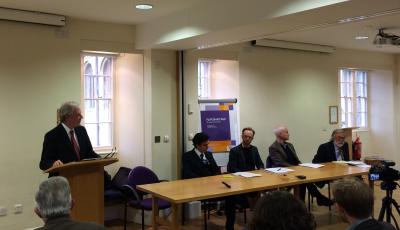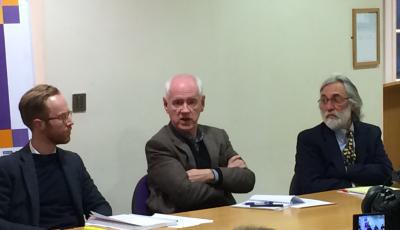The Role of the Prosecutor at Sentencing
In this post, DPhil candidate Lyndon Harris discusses yesterday’s seminar, part of the Centre for Criminology’s 50th Anniversary Lecture Series.
Posted:
Time to read:
On 3 March 2016 we collected in the Lee Shau Kee Seminar Room, Wadham College, for what promised to be an interesting and rewarding discussion on a topic that has to date attracted comparatively little by way of scholarship―the role of the prosecutor at sentencing.

- Professor Allan Manson, the leading Canadian sentencing scholar, former judge, and current visitor at Wadham;
- Andrew Britton, a New Zealand prosecutor and graduate of the University of Oxford currently conducting research at Cambridge; and
- Paul Humpherson, a practising barrister, lawyer at the Law Commission, and graduate of the University of Oxford.
Joining the panel as a discussant was Lord Ken MacDonald QC, former Director of Public Prosecutions and warden at Wadham College.
Each panelist gave a ten minute presentation about their views on the role of the prosecutor in their jurisdictions. Professor Manson began by setting out the importance of the constitutional context, noting that the split jurisdiction gave rise to some interesting comparisons with England and Wales. He explained how in the Canadian provinces, the Attorney General employes prosecutors. Against that background, he considered the way in which Canada had followed in the footsteps of the English courts as regards the traditional view of the role of prosecutor, namely a passive role, assisting the court. Professor Manson then touched on a topic that would later dominate the discussion―the impact the victims movement had on the criminal justice system and how the role of the prosecutor had changed in that regard. Interestingly, Professor Manson explained how this culture shift began to emerge in the 1970s and 1980s, a phenomenon that has recently gained much traction in England and Wales. Coupled with other features that he identified, he explained that the result was a prosecutorial community that had become more aggressive, more active, and more comfortable making a specific sentencing submission. Finally, Professor Manson noted that it’s common in Canada to see prosecutors suggest a sentence at the top of, or even above, the sentencing range, a situation which previously would have been seen to be outside of their remit.
Mr Britton then gave an account of the state of play in New Zealand, first noting that it was deeply rooted in English law and accordingly, had adopted the more traditional common law view that the prosecutor’s role at sentencing was restricted. He explained that the general view was of a disinterest in the outcome of the sentencing hearing, instead favouring the conventional role of providing assistance to the court as to the facts of the case and any relevant statutory provisions and sentencing principles. However, Mr Britton contended that in practice, the situation was rather different; prosecutors were invested in the outcome of the sentencing hearing, not least because of the ability for prosecutors to appeal against sentences that were considered to be too low. In that regard he drew attention to an interesting dichotomy that exists in many jurisdictions around the world, not least in England and Wales: can the traditional position be maintained in light of the prosecution’s power to appeal against a sentence? At a time at which there are calls to extend the powers of the prosecution to appeal sentences they consider to be too lenient―and notably Northern Ireland have just extended their powers to include offences carrying maximum sentences as low are two years―the role of the prosecutor at sentencing becomes all the more relevant. Finally, citing the interesting Australian High Court case Barbaro v The Queen, Mr Britton turned our minds to what appeared to be the outlier in the common law world; the Australian High Court had dismissed appeals against sentence on the basis of a denial of procedural fairness (in one appeal, the refusal to hear submissions on sentencing from the prosecution) as in its view ‘such submissions are not submissions of law, but merely opinions.’ This raised questions of how this decision might translate in jurisdictions in which sentencing guidelines were prevalent, a point of particular interest as the establishing of sentencing commissions and the appetite for sentencing guidelines continues to grow.
Finally, Mr Humpherson drew on his experience at the independent bar as a prosecutor and considered the symmetry and asymmetry between the role of the prosecutor and the role of a defence advocate. Both, it was noted, owed a duty to the court and to their client. However, contrasting the way in which those roles were required to be performed demonstrated the fundamental difference between the two: for a defence advocate, there existed a tension between the two aspects of the role―a defence advocate could not mislead the court but the duty to represent the interest of the client would trump the duty to assist the court. In the case of a prosecution advocate, the tension between the two roles was less pronounced. Mr Humpherson noted however that in assisting the court, it could require a prosecutor to act contrary to his or her case. In that regard he alluded to the role of the prosecutor as an agent of justice; however, as Professor Manson highlighted during the later discussion, this can rest upon the nature of the individual prosecutor which could be influenced by the prosecutor’s mentor and his or her background.

The seminar provided the attendees with a fantastic opportunity to hear from four individuals with a wealth of experience across numerous jurisdictions in differing roles. The discussion raised―and answered―many interesting questions that our sentencing systems must face.
Keywords:
Share:
